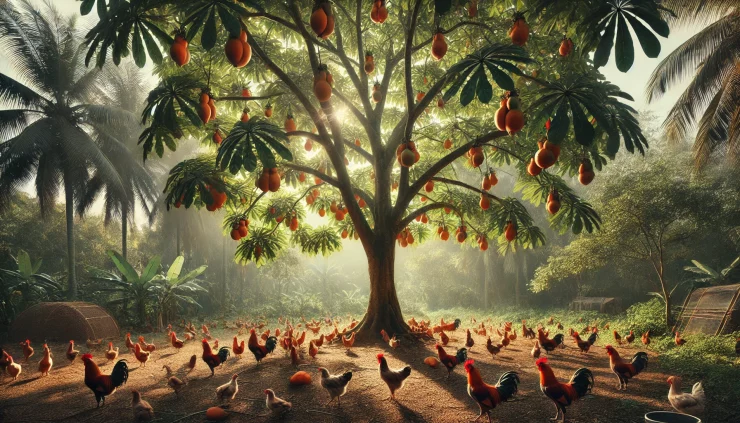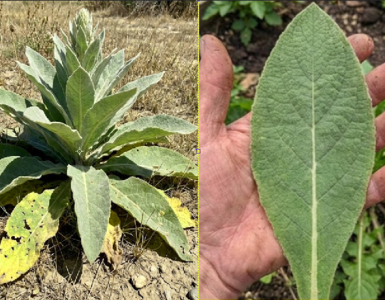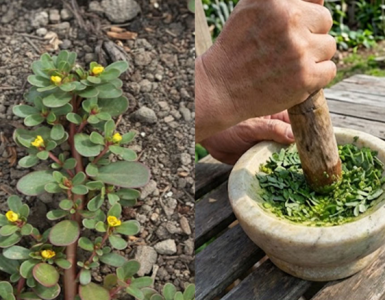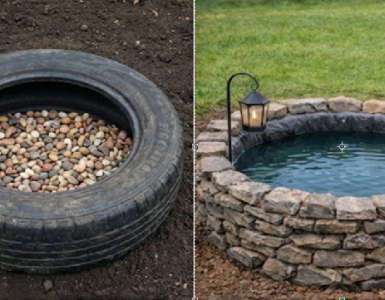Running a poultry farm is not just about raising chickens and ensuring they have a safe environment; it also requires careful attention to their nutrition and health. One of the most effective, natural, and sustainable ways to improve the overall health and productivity of your chickens is by planting pawpaw (papaya) trees around your farm. Pawpaw trees not only offer a wealth of nutritional benefits for poultry, but they also provide shade, help with pest control, and can boost the overall efficiency of your farm.
In this article, we’ll explore the many reasons why you should plant at least 20 pawpaw trees on your poultry farm and how they can enhance the well-being of your birds.
1.Pawpaw Trees Provide Nutrient-Rich Feed for Chickens
Pawpaw fruits are packed with essential vitamins and minerals that are beneficial for chickens. The fruit, seeds, and leaves are all valuable components of a balanced poultry diet. Pawpaw is rich in:
Vitamins A, C, and E: These vitamins are crucial for maintaining the immune system, promoting healthy skin, and supporting reproductive health in chickens.
Papain Enzyme: This natural digestive enzyme found in pawpaw helps chickens break down proteins more efficiently, improving digestion and nutrient absorption.
Minerals: Pawpaw is also high in calcium, potassium, and magnesium, all of which are vital for bone health and egg production in laying hens.
How It Helps:
Regularly feeding pawpaw fruit to your chickens can boost their immune systems and improve their overall health.
The leaves and seeds of the pawpaw tree can be added to their diet to aid digestion and reduce the risk of intestinal parasites.
2.Natural Deworming Properties
Pawpaw seeds have powerful anthelmintic (deworming) properties, making them an excellent natural remedy for intestinal parasites in poultry. Unlike chemical dewormers, which can be harsh and leave residues in eggs and meat, pawpaw seeds are a gentle, organic option for keeping your chickens parasite-free.
How It Helps:
Grinding pawpaw seeds and adding them to your chickens’ feed can naturally eliminate intestinal worms without the need for chemical treatments.
Regular use of pawpaw seeds as a dewormer ensures that your flock remains healthy and productive without harmful side effects.
3.Promotes Better Egg Production
For poultry farmers focused on egg production, planting pawpaw trees can lead to significant improvements in egg quality and quantity. The vitamins and minerals in pawpaw, particularly calcium and vitamin E, are essential for producing strong, healthy eggs with robust shells.
How It Helps:
The calcium in pawpaw helps laying hens produce eggs with stronger shells, reducing the number of broken or cracked eggs.
Vitamin E enhances reproductive health, leading to improved egg production and fertility rates in your flock.
4.Shade and Shelter for Poultry
Pawpaw trees grow quickly and produce large, broad leaves that provide ample shade for your chickens. Shade is essential for poultry farms, especially in warm climates, as it helps reduce heat stress in chickens. Overheating can lead to a drop in egg production and general health issues in your birds.
How It Helps:
Planting pawpaw trees around your poultry farm creates natural shaded areas where chickens can rest during the heat of the day.
The shade helps regulate body temperature in hot weather, preventing heat stress and maintaining optimal egg production levels.
5.Natural Pest Control
Pawpaw trees are known to repel certain pests that can harm chickens or damage crops. Additionally, chickens that forage under pawpaw trees can benefit from the natural pest-repelling properties of the plant, reducing the need for chemical pesticides.
How It Helps:
The natural compounds in pawpaw leaves can deter pests such as mites and lice from infesting your chickens.
Chickens that forage around pawpaw trees are less likely to encounter harmful pests, reducing the need for chemical interventions.
6.Sustainable and Cost-Effective Farming
One of the most significant benefits of planting pawpaw trees is that they are low-maintenance and highly sustainable. Once established, pawpaw trees require minimal care and produce fruit, leaves, and seeds that can be used as free feed supplements for your poultry.
How It Helps:
Pawpaw trees are a renewable resource that provides consistent feed and health benefits for chickens year-round.
By relying on pawpaw trees for natural feed, deworming, and pest control, you can reduce your farm’s reliance on expensive chemical treatments and processed feeds, saving costs in the long run.
7.How to Incorporate Pawpaw into Your Poultry Farm
Planting 20 pawpaw trees around your poultry farm is a manageable and beneficial project. Here’s how you can integrate pawpaw trees into your farm environment:
Choose the Right Location: Pawpaw trees thrive in well-drained soil with plenty of sunlight. Plant them around the perimeter of your poultry farm or in areas where your chickens forage.
Allow for Proper Spacing: Pawpaw trees grow rapidly, so make sure to space them at least 5-8 feet apart to allow for full growth and to provide ample shade.
Feed the Pawpaw to Your Chickens: Once the trees begin to produce fruit, you can chop the fruits, seeds, and leaves and add them to your chickens’ feed. Pawpaw can be given as a treat or mixed into their regular feed to provide additional nutrients.
Use Pawpaw Seeds as a Dewormer: Crush or grind pawpaw seeds and mix them with your chickens’ feed once a week to help keep parasites at bay naturally.
Enjoy the Long-Term Benefits: Once your pawpaw trees are established, they will continue to provide fruit and health benefits to your poultry for many years with little maintenance.
Planting at least 20 pawpaw trees on your poultry farm is a smart, sustainable investment that can greatly improve the health, productivity, and well-being of your chickens. The nutritional benefits of pawpaw, combined with its natural deworming and pest-repelling properties, make it an invaluable resource for poultry farmers. Additionally, the shade and shelter provided by these fast-growing trees can help reduce heat stress and promote a more comfortable environment for your flock.
By incorporating pawpaw trees into your farm, you not only support the health of your chickens but also move toward more sustainable, cost-effective farming practices. So, if you have a poultry farm, don’t wait — start planting those pawpaw trees today!






Add comment